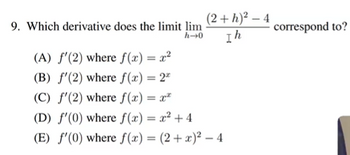
Calculus: Early Transcendentals
8th Edition
ISBN: 9781285741550
Author: James Stewart
Publisher: Cengage Learning
expand_more
expand_more
format_list_bulleted
Question

Transcribed Image Text:9. Which derivative does the limit lim
h→0
(2+h)²2-4
Ih
(A) f'(2) where f(x) = x²
(B) f'(2) where f(x) = 2*
(C) f'(2) where f(x) = x
(D) f'(0) where f(x) = x² + 4
(E) f'(0) where f(x) = (2+ x)² - 4
correspond to?
Expert Solution
This question has been solved!
Explore an expertly crafted, step-by-step solution for a thorough understanding of key concepts.
Step by stepSolved in 3 steps with 3 images

Knowledge Booster
Similar questions
- Given f(x) = 3x² – 3x + 2, find f'(x) using the limit definition of the derivative. ở 3(2+h) −3(2+h)+2 6xh+3h²3h f(x + h) = f(x +h)-f(x) = f(x+h)-f(x) h f'(x) = lim h→0 f(x +h)-f(x) h = 6x +3h3 6x - 3arrow_forwardSuppose f(x) is a continuous differentiable function. Some of the values of the function and its derivative are shown below. X -2 3 6 7 -3 f(x) 4 F'(x) 6 0 2 (a) Let g(x) = f($). . Find g'(x). Og'(x) = -(2/2) (²) Og'(x) = ($)F($) Og'(x) = -6f'() Og'(x) = ($) f'( ) Og'(x) = f'( =) Now find g'(3) 2 -2 -5 4 3 = (b) Find the equation of the tangent line to f(x) at x = 1. Use y as the dependent variable. Now approximate f(7) =arrow_forwardFind Derivative f'(x): f(x)= 5e²x - 40e(-0.1x) + 11 + In(4x) O 5e2x - 40e(-0.1x) + 4/x O 5e2x - 40e(-0.1x) + 1/x O 10e2x + 4e(-0.1x) + 1/x O 10e2x + 4e(-0.1x) + 4/xarrow_forward
- 1. For each function given below, calculate the derivative at a point f'(a) using the limit definition. (a) f(x) = 2x2 – 3r f'(0) =? (b) f(x) = /2x + I f'(4) =? 1 (c) f(x)= f'(3) =? x - 2 (d) f(x)= (x – 3)3 f'(4) =? 2. For each function f(x) given below, find the general derivative f' (x) as a new function by using the limit definition. (a) f(x) = V – 4 f'(x) =? (b) f(x)= -r³3 f'(x) =? (c) f(r) = f'(x) =? 3x + 1 1 (d) f(x) = f'(x) =? %3D 3. For each function f(x) given below, find the equation of the tangent line at the indicated point. (a) f(x)= x – r² at (2, –2) (b) f(x) = 1– 3r2 at (0, 1) 1 f(x) = 2r (c) at x = 1 (d) f(x) = x + VI at x = 1 4. Given f(x) = ax² + 2x and f'(1) = 5, solve for a.arrow_forwardGiven f(x) = 4, find f'(x) using the limit definition of the derivative. f(x + h) = f(x +h)-f(x) = f(x+h)-f(x) h f'(x) = lim h→0 f(x +h)-f(x) h = O 0 O 0 of 0arrow_forward
arrow_back_ios
arrow_forward_ios
Recommended textbooks for you
 Calculus: Early TranscendentalsCalculusISBN:9781285741550Author:James StewartPublisher:Cengage Learning
Calculus: Early TranscendentalsCalculusISBN:9781285741550Author:James StewartPublisher:Cengage Learning Thomas' Calculus (14th Edition)CalculusISBN:9780134438986Author:Joel R. Hass, Christopher E. Heil, Maurice D. WeirPublisher:PEARSON
Thomas' Calculus (14th Edition)CalculusISBN:9780134438986Author:Joel R. Hass, Christopher E. Heil, Maurice D. WeirPublisher:PEARSON Calculus: Early Transcendentals (3rd Edition)CalculusISBN:9780134763644Author:William L. Briggs, Lyle Cochran, Bernard Gillett, Eric SchulzPublisher:PEARSON
Calculus: Early Transcendentals (3rd Edition)CalculusISBN:9780134763644Author:William L. Briggs, Lyle Cochran, Bernard Gillett, Eric SchulzPublisher:PEARSON Calculus: Early TranscendentalsCalculusISBN:9781319050740Author:Jon Rogawski, Colin Adams, Robert FranzosaPublisher:W. H. Freeman
Calculus: Early TranscendentalsCalculusISBN:9781319050740Author:Jon Rogawski, Colin Adams, Robert FranzosaPublisher:W. H. Freeman
 Calculus: Early Transcendental FunctionsCalculusISBN:9781337552516Author:Ron Larson, Bruce H. EdwardsPublisher:Cengage Learning
Calculus: Early Transcendental FunctionsCalculusISBN:9781337552516Author:Ron Larson, Bruce H. EdwardsPublisher:Cengage Learning

Calculus: Early Transcendentals
Calculus
ISBN:9781285741550
Author:James Stewart
Publisher:Cengage Learning

Thomas' Calculus (14th Edition)
Calculus
ISBN:9780134438986
Author:Joel R. Hass, Christopher E. Heil, Maurice D. Weir
Publisher:PEARSON

Calculus: Early Transcendentals (3rd Edition)
Calculus
ISBN:9780134763644
Author:William L. Briggs, Lyle Cochran, Bernard Gillett, Eric Schulz
Publisher:PEARSON

Calculus: Early Transcendentals
Calculus
ISBN:9781319050740
Author:Jon Rogawski, Colin Adams, Robert Franzosa
Publisher:W. H. Freeman


Calculus: Early Transcendental Functions
Calculus
ISBN:9781337552516
Author:Ron Larson, Bruce H. Edwards
Publisher:Cengage Learning